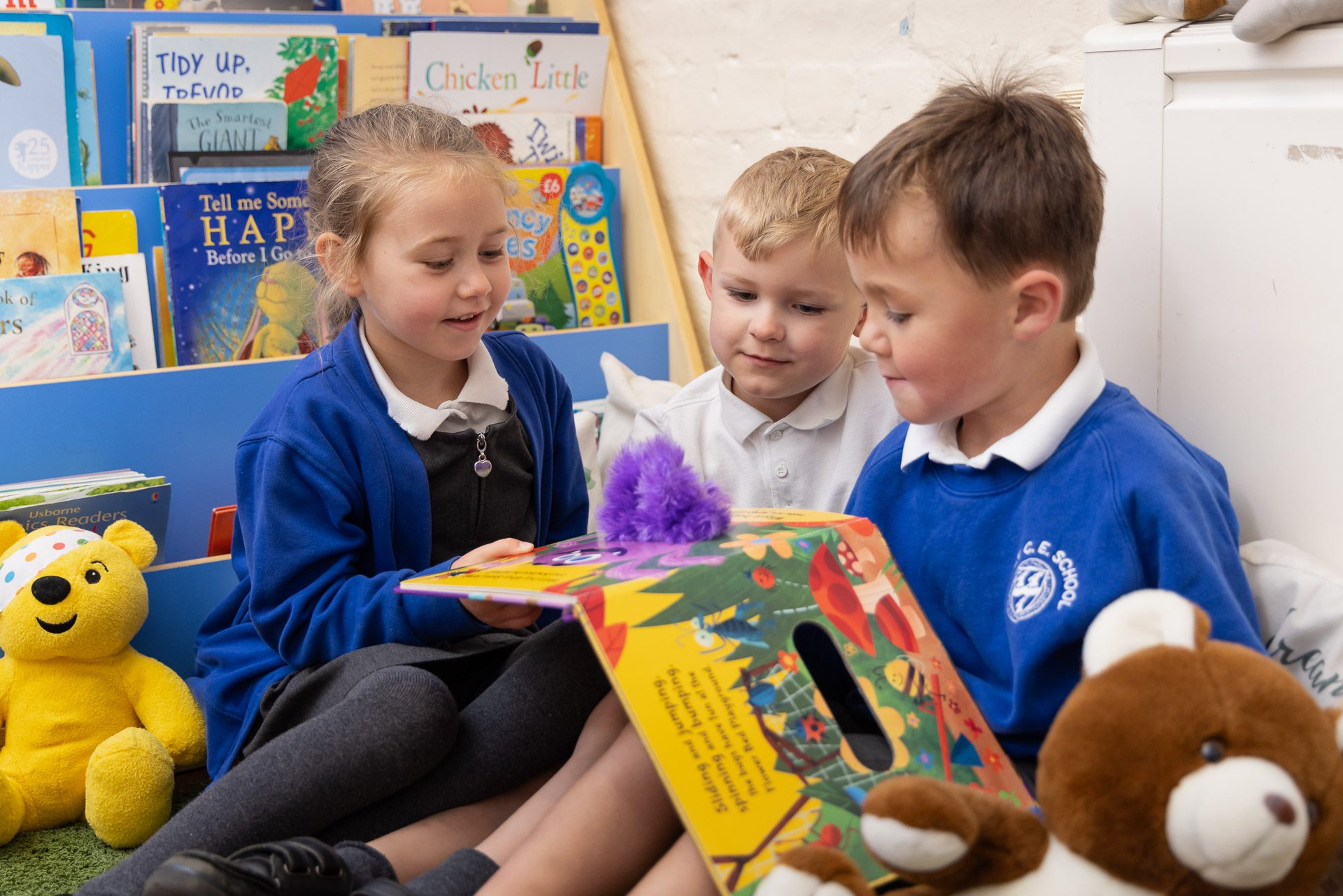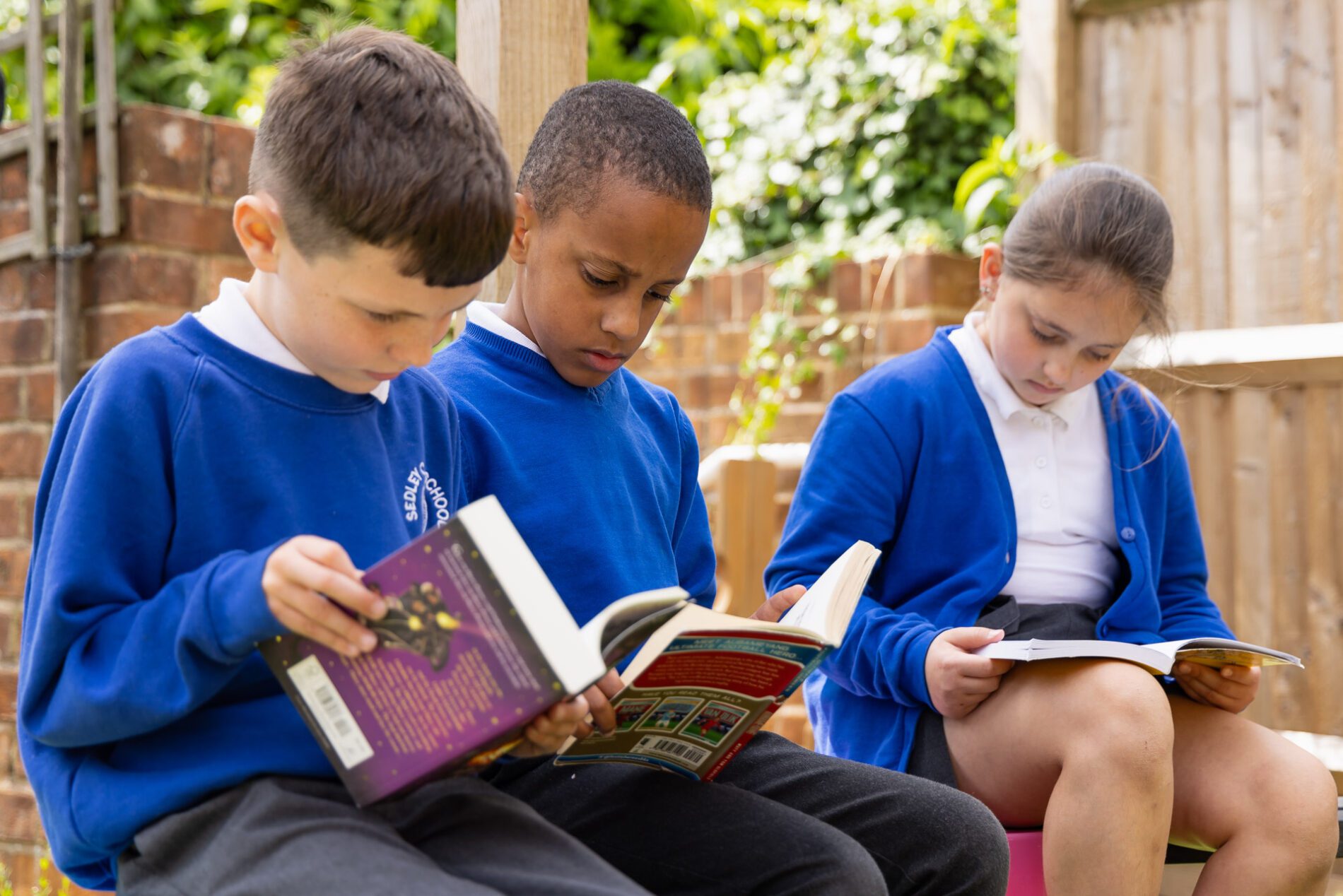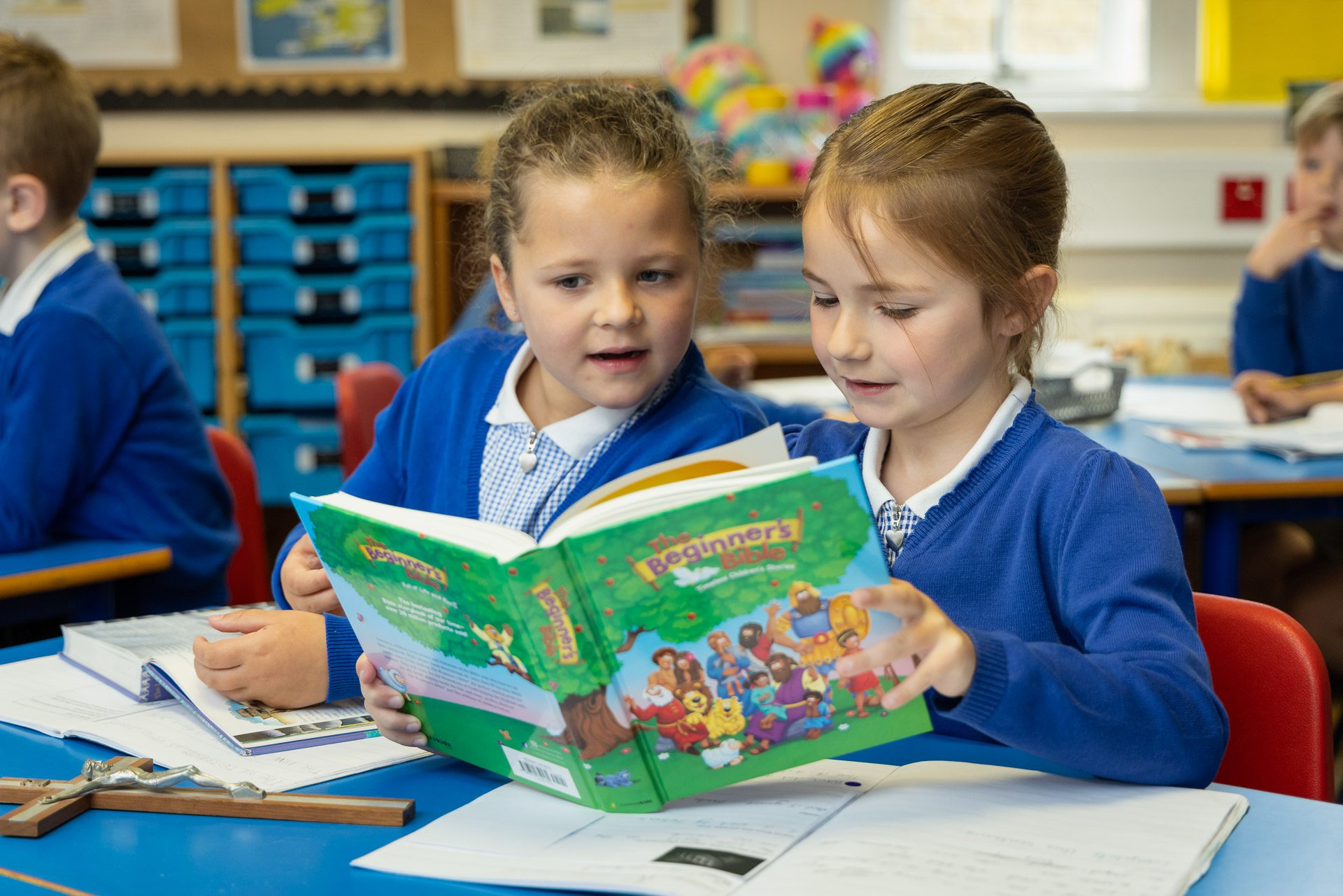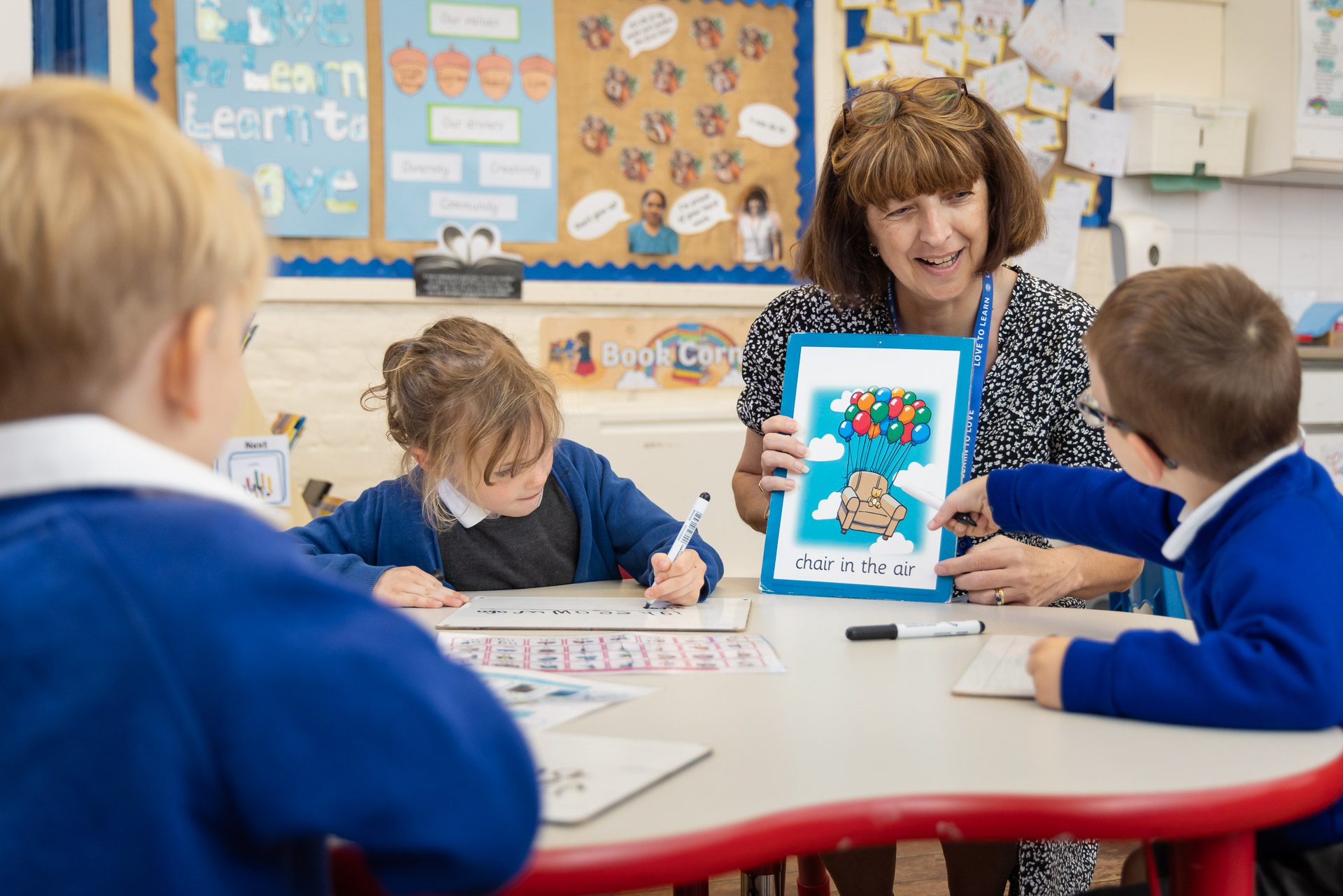English Reading Subject Leader: Mrs T Handley
Reading is one of the most important life skills. It promotes achievement and ensures access to the breadth of the curriculum. We teach our pupils to extend their concepts and find information, helping them to learn more when reading. We aim to develop a varied diet of reading, improving focus, concentration and memory. When reading, we become immersed in stories, visualising imagery, opening our minds and opening doors to new and exciting worlds. Books can take us to new places, describing events and people from the past. This year we have focused on expanding our vocabulary and language usage. We have investigated new words and the roots of similar words. This allows us to subconsciously absorb information on sentence and language features, therefore, improving our writing skills.
Intent
Reading is the main vehicle through which children will discover essential knowledge. Reading is the driving force behind our curriculum and is promoted and celebrated at every opportunity, through adults reading to pupils, reading with pupils and times to hear reading by pupils.
Our reading curriculum strives to foster a lifelong love of reading. This curriculum is delivered through synthetic phonics, guided reading, home reading, reading across the curriculum, regular opportunities for independent reading and hearing quality texts read aloud every day. All of these are essential components as they offer the range of opportunities needed to develop fluent, enthusiastic and critical readers.


Implementation
Our curriculum is developing and evolving, as we recognise the importance of adapting to the needs and interests of our children, therefore we choose a range of high quality texts for use in the classroom. These are carefully planned out and link with our learning themes across the school. We aim to develop a language rich environment by exposing all children to a wide range of genres that explore a variety of themes and are written by a range of authors. We encourage children to read from a selection of books and we ensure that reading is happening regularly across the school in a variety of ways. Opportunities for reading are embraced across the whole curriculum and assessment of reading is thorough and robust in order to inform future learning.
Parents are valued in their contributions to supporting reading and all children are expected to regularly read at home, using their chosen text and also other books that are read for even wider enjoyment. As part of our recognition of the significant input from parents, we have provided workshops and opportunities for learning about phonics and early reading, so that help at home can be of a high standard leading to a greater impact in progress and enjoyment.
We celebrate reading and recognise the efforts and achievements of all children.
Impact
We are determined that every pupil will learn to read, and we closely assess and review progress in order to ensure gaps are addressed. Our children are enthusiastic in their reading approach and we are developing confident readers that are able to access wider learning by applying their skills.

English Reading in Each Stage
Language comprehension (necessary for both reading and writing) starts from birth. It only develops when adults talk with children about the world around them and the books (stories and non-fiction) they read with them, and enjoy rhymes, poems and songs together. Skilled word reading, taught later, involves both the speedy working out of the pronunciation of unfamiliar printed words (decoding) and the speedy recognition of familiar printed words.
Reading in the Early Years is addressed with the specific area of Literacy
Children at the expected level of development will:
- Say a sound for each letter in the alphabet and at least 10 digraphs;
- Read words consistent with their phonic knowledge by sound-blending;
- Read aloud simple sentences and books that are consistent with their phonic knowledge, including some common exception words.
The systematic teaching of Phonics using Little Wandle Letters and Sounds Revised is a core element of teaching reading in Early Years. Phonics teaching is delivered on a daily basis in a sequential and exciting way so that long-term memory is embedded. Our learners are taught to recognise, blend and segment sounds. Teachers draw upon formative and summative assessments to ensure that pupils are stretched and challenged and to identify those who may require additional support. ‘Keep Up’ interventions are planned for those pupils who are identified as working below expected levels.
Decodable books are carefully matched to each child’s secure phonic knowledge in reading words, including tricky words.
Recommended Books for Reception
For more recommended reading, please visit the EYFS Class page
To read our Phonics and Early Reading Policy, please visit the policy page.

Children in Key Stage One are exposed to a wide variety of texts and have regular opportunities to read with an adult, either one to one or in a group. ‘Reading Squad’ takes place three times per week, allowing children to practise and rehearse their reading, leading to confidence and increased accuracy, and avoiding cognitive overload. Our reading toolkit ‘Vipers’ is introduced within reading sessions.
Quality texts are a key feature and the enjoyment of books and stories is strong, children are enthusiastic about books and love to share their thoughts and ideas about the reading they are doing.
Reading at home is encouraged and celebrated and texts are carefully pitched and matched alongside phonic ability. Daily phonics sessions are a strength and allow our Key Stage One children to increase their decoding abilities.
Click the links below to view recommended texts for year 1 and year 2:
Recommended Texts for Year One
Recommended Texts for Year Two

We provide a wide range of texts for pupils in Key Stage Two so that pupils are able to access reading and therefore a love of reading is fostered. Guided reading and individual reading are implemented and sharing a class reader is of great importance. Children are exposed to a range of genres, both within fiction and non-fiction.
The use of our reading toolkit VIPERS is embedded and developed further in Key Stage Two, allowing children to develop reading skills across a wide range of areas.
Pupils read independently for pleasure and in teacher-directed whole class and small group sessions to develop fluency, resilience, and stamina with reading and comprehension skills. Teachers adapt activities for accessibility for SEND groups and challenge for more able and confident reader
Click the links below to view recommended texts for year 3-6:
Recommended Texts for Year Three
Recommended Texts for Year Four
Recommended Texts for Year Five
Recommended Texts for Year Six

English Reading Progression
Reading Vipers is our toolkit for teaching the range of reading skills needed. It enables the identification of the key areas of reading and helps to give us prompts and questions to use in order to develop a range of reading strategies. As your child becomes a more fluent reader, the Vipers areas of reading will help to continue to challenge and teach a range of reading skills.
When progressing, young readers will, at a particular stage, successfully make the leap into their first chapter of books. Please click here to help pupils pick a selection of short, illustrated chapter books that are perfect for children launching into independent reading.
Assessments
Assessments are used to monitor progress and to identify any child needing additional support as soon as they need it. This is evaluated daily within the class to identify children needing ‘Keep-up support’. Each week teachers use ‘Review lessons’ to assess gaps, address these immediately and secure fluency of GPCs, words and spellings.
Every six weeks teachers will perform a ‘summative assessment’ to assess progress, identify gaps in learning that need to be addressed, identify any children needing additional support and plan the ‘Keep-up support’ that they need.
Through the Senior Leadership Team and the Little Wandle Letters and Sounds Revised assessment tracker, teachers will be able to narrow attainment gaps between different groups of children and offer any additional support needed.
Children in Year 1 will sit the Phonics Screening Check. Any child not passing the check will re-sit this in Year 2.
Ongoing assessments will continue for children in years 2 to 6 through their teacher’s ongoing formative assessment as well as through the half-termly Little Wandle Letters and Sounds Revised summative assessments.
SEND Information
Teachers adapt activities for accessibility for SEND groups and challenge more able and confident readers. Additional reading support is available for vulnerable children.
Children in Reception and Year 1 who are receiving additional phonics ‘Keep-up sessions’ read their reading practice book to an adult daily, this ensures consistency and pace of progress.
Home Learning
As a parent, you are your child’s first and most important teacher. When you help your child learn to read, you are opening the door to a world of books and learning.
Reading aloud to children is the best way to get them interested in reading. Before long they will grow to love stories and books. Eventually, they will want to read on their own.
With the help of parents, children can learn how to read and can practise reading until they can read for their own enjoyment. Then they will have a whole world of information and knowledge at their fingertips!
Reading can be a family activity. Spending time with word games, stories, and books will help your child to:
• gather information and learn about the world
• learn how stories and books work – that they have beginnings, endings, characters, and themes
• build a rich vocabulary by reading and talking about new words
• learn how to listen and how think
• learn the sounds of language and language patterns
• fall in love with booksIt’s natural to want to compare your child’s reading abilities with those of other children of the same age, but not all children develop reading skills at the same pace.
What’s important is that you are aware of your child’s reading level so that you can choose books and activities that will help him or her improve. Use the tips in this guide and work with your child’s teacher and others to improve your child’s reading skills.

